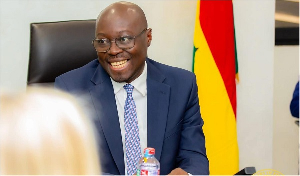S&P Global Ratings has upgraded the country’s foreign-currency sovereign credit rating from Selective Default (SD) to CCC+, reflecting renewed investor confidence and the positive momentum in economic management under the leadership of Finance Minister Dr Cassiel Ato Forson.
The announcement, made on May 9, 2025, comes as Ghana makes decisive progress in restructuring its external debt and stabilising its macroeconomic environment, following years of turbulence.
According to S&P’s latest report, Ghana’s negotiations with its remaining commercial creditors are nearing completion, a key milestone that has restored credibility and eased fiscal pressure.
S&P highlights that while challenges persist, the current administration’s firm commitment to reforms is yielding tangible benefits. Inflation, though still elevated at 22%, is steadily falling, driven by a strengthening cedi and lower energy prices.
This progress, according to the report, reflects strong policy direction from the Ministry of Finance under Dr Ato Forson.
Dr Forson’s stewardship has seen the launch of vital legislative reforms, including amendments to the Public Financial Management Act, reinstatement of fiscal rules, and steps to establish an independent fiscal council, measures aimed at ensuring prudent management of public finances.
Despite inheriting significant fiscal arrears, the government is prioritising expenditure-led consolidation over aggressive tax hikes, in line with conditions under the IMF’s Extended Credit Facility (ECF) program.
The Mahama administration is targeting a primary surplus of 1.5% of GDP in 2025 and has committed to keeping expenditure growth below 10% annually over the next four years, a sharp departure from the 28% average increase seen over the past two decades.
Additionally, S&P projects that Ghana’s public debt, net of liquid assets, will decline from 71.4% of GDP at end-2024 to 47.4% by 2028.
Interest expenditure, once a crippling 48% of government revenue in 2021-2022, has fallen to about 25% following the debt restructuring.
Inflation, though still above target, is expected to ease gradually as monetary policy credibility improves.
The upgrade by S&P is a strong signal to the international investor community and development partners that Ghana is turning a crucial corner.
While acknowledging lingering risks, including election-year spending pressures and external vulnerabilities, S&P notes that Ghana’s improving external metrics, steady policy reforms, and supportive growth outlook justify the new, higher rating.









